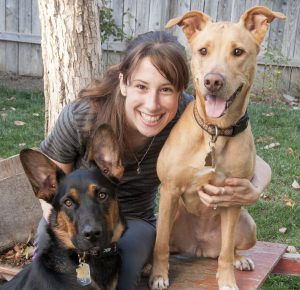Talk Training to Me with Anamarie Johnson
Talk Training to Me with Anamarie Johnson
When
Bookings
Event Type
On-Demand Webinar: Watch as soon as you register
Webinar Description
Dog trainers’ word choice may provide information about how a trainer understands and relates to the dogs they work with. To date, there has been little analysis of the words trainers use or whether specific words or phrases can readily differentiate the type of training methodology practiced.
We gathered demographic and educational information and the stated training philosophy from the websites of 100 dog trainers from ten US cities identified by a popular consumer review site to determine whether there was a difference in word use between training methodologies, if women practiced non-aversive techniques more than men and if non-aversive trainers were more often certified than aversive trainers.
Trainers were identified as using either non-aversive methods (utilizing positive reinforcement and no use of aversive leash tools) or aversive methods (may use positive reinforcement but will also utilize aversive methods to punish) by trainer self-identification or training tool use.
We then qualitatively analyzed the website texts outlining training philosophy using the text analysis software MAXQDA. Specific words or phrases that were selected based on their importance within training were turned into 20 codes which were examined for their context and frequency of use across the 100 philosophies. Some codes differentiated between training methodologies, particularly those related to training tool use. For example, aversive trainers referred to corrective collars as “electronic collars” and explained their use; non-aversive trainers called the same tool a “shock collar” and stated that it was never used in their training. We found women practiced positive reinforcement training significantly more often than men. Positive reinforcement trainers were also significantly more likely to be certified than balanced trainers.
This shows that there is a wide variability in word use by dog trainers leading to inconsistencies in information provided to the public. The low rate of certification also raises concerns about the scarcity of licensing and lax oversight of dog trainers in the USA leading to potential safety risks for both owners and dogs.
Learning Objectives
- Help trainers understand how other trainers communicate and describe their dog training
- Get an understanding of how trainers using other methods understand and describe their work
- How trainers can do better in their communication with the general public
Your Presenter – Anamarie Johnson
Anamarie Johnson comes to the Canine Science Collaboratory after working for a number of years in the animal shelter and dog training world. She graduated in 2011 from University of California with a double major in Science and Technology Studies and Evolutionary Anthropology.
She then received her MA from Hunter College in Applied Animal Behavior and Conservation investigating attachment behavior in shelter dogs. For her graduate research, she is interested in human-dog interactions particularly investigating choice in dog training methods.
PPG Members
PPG Members use your $10.00 discount coupon code at registration to access your membership rate. The code can be found in your membership area.
Not yet a member? Click here to join and begin receiving discounts on PPG member events.
Bookings
Log in if you already have an account with us.

